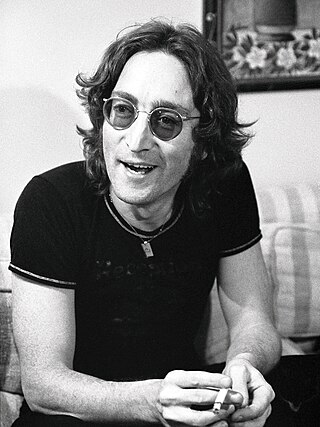
John Winston Ono Lennon was an English singer-songwriter, musician and political activist. After a troubled childhood, he gained worldwide fame as the founder, co-lead vocalist and rhythm guitarist of the Beatles. His songwriting partnership with Paul McCartney remains the most successful in history.

Yoko Ono is a Japanese multimedia artist, singer, songwriter, and peace activist. Her work also encompasses performance art and filmmaking.

Some Time in New York City is the third collaborative studio album, and first live album by John Lennon and Yoko Ono as Plastic Ono Band, a double album, it includes backing by the American rock band Elephant's Memory. Released in June 1972 in the US and in September 1972 in the UK on Apple Records, it is Lennon's sixth album to be released under his own name, and his fourth collaboration with Ono. Like Lennon's previous solo albums, it was co-produced by Lennon, Ono and Phil Spector. The album's agitprop lyrics are politically charged compared to its predecessors, addressing political and social issues and topics such as sexism, incarceration, colonialism, and racism.

Live Peace in Toronto 1969 is a live album by the Plastic Ono Band, released in December 1969 on Apple Records. Recorded at the Toronto Rock and Roll Revival festival, it was the first live album released by any member of the Beatles separately or together. John Lennon and his wife Yoko Ono received a phone call from the festival's promoters John Brower and Kenny Walker, and then assembled a band on very short notice for the festival, which was due to start the following day. The band included Eric Clapton, Klaus Voormann, and drummer Alan White. The group flew from London and had brief unamplified rehearsals on the plane before appearing on the stage to perform several songs; one of which, "Cold Turkey", was first performed live at the festival. After returning home, Lennon mixed the album in a day.

Wedding Album is the third and final in a succession of three collaborative experimental albums by John Lennon and Yoko Ono. It followed Unfinished Music No. 1: Two Virgins and Unfinished Music No. 2: Life with the Lions. In Britain, the album was released credited by "John and Yoko", without last names mentioned. In the United States, it was released credited by "John Ono Lennon & Yoko Ono Lennon."

Unfinished Music No. 2: Life with the Lions is the second of three collaborative experimental albums of avant-garde music by John Lennon and Yoko Ono, released in May 1969 on Zapple, a sub label of Apple. It was a successor to 1968's highly controversial Unfinished Music No. 1: Two Virgins, and was followed by the Wedding Album. The album peaked in the United States at number 174, 50 places lower than the previous album. The album, whose title is a play on words of the BBC Radio show Life with The Lyons, was recorded at Queen Charlotte's Hospital in London and live at Cambridge University, in November 1968 and March 1969, respectively. The Cambridge performance, to which Ono had been invited and to which she brought Lennon, was Lennon and Ono's second as a couple. A few of the album's tracks were previewed by the public, thanks to Aspen magazine. The album was remastered in 1997.
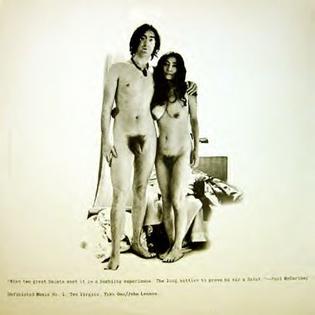
Unfinished Music No. 1: Two Virgins is the first of three collaborative experimental albums released by John Lennon and Yoko Ono on Apple Records. It was the result of an all-night session of musical experimentation with Yoko in John's home studio at Kenwood, while his wife, Cynthia Lennon, was on holiday in Greece. Lennon and Ono's 1968 debut recording is known not only for its avant-garde content, but also for its cover, which shows the couple naked. This made the album controversial to both the public and the parent record company EMI, which refused to distribute it. In an attempt to avoid controversy, the LP record was sold in a brown paper bag, and distributed by Track and Tetragrammaton in the United Kingdom and the United States respectively. Two Virgins, while failing to chart in the UK, reached number 124 in the US. The album was followed six months later by Unfinished Music No. 2: Life with the Lions.
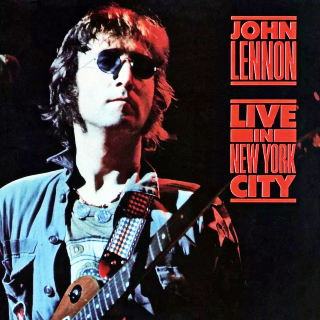
Live in New York City is a posthumous live album by English rock musician John Lennon with the Plastic Ono Elephant's Memory Band. It was prepared under the supervision of his widow, Yoko Ono, and released in 1986 as his second official live album, the first being Live Peace in Toronto 1969.

The Plastic Ono Band was a rock band and Fluxus-based artist collective formed by John Lennon and Yoko Ono in 1968-9 for their collaborative musical and sound art projects, films, conceptual art projects and eventual solo LPs. The creation of the Plastic Ono Band, which began in 1967 with Ono's idea for an art exhibition in Berlin, allowed Lennon to separate his artistic output from that of the Beatles.

A bed-in is a nonviolent protest against wars, initiated by Yoko Ono and her husband John Lennon during a two week period in Amsterdam and Montreal as an experimental test of new ways to promote peace. As the Vietnam War raged in 1969, artist Ono and Lennon held one bed-in protest at the Hilton Hotel in Amsterdam and one at the Queen Elizabeth Hotel in Montreal. The idea is derived from a "sit-in", in which a group of protesters remain seated in front of or within an establishment until they are evicted, arrested, or their requests are met.

"The Ballad of John and Yoko" is a song by the English rock band the Beatles that was released as a non-album single in May 1969. It was written by John Lennon and credited to the Lennon–McCartney partnership, and chronicles the events surrounding the wedding of Lennon and Yoko Ono. The song was the Beatles' 17th UK number-one single and their last for 54 years until "Now and Then" in 2023. In the United States, it was banned by some radio stations due to the lyrics' reference to Christ and crucifixion. The single peaked at number 8 on the US Billboard Hot 100. The song has subsequently appeared on compilation albums such as Hey Jude, 1967–1970, Past Masters, and 1.
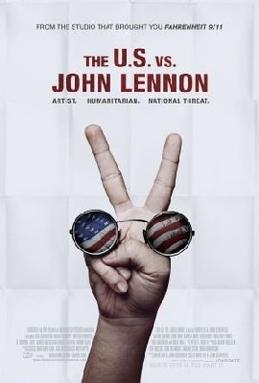
The U.S. vs. John Lennon is a 2006 American documentary film about John Lennon's transformation from member of the Beatles to anti-war activist opposing the reelection of Richard Nixon as president in 1972. The film also details the attempts by the Nixon administration to deport Lennon from the US to end his anti-war and anti-Nixon campaigns. The film had its world premiere at the Venice Film Festival and its North American premiere at the Toronto International Film Festival. It was released in New York City and Los Angeles, California on 15 September 2006, and had a nationwide release on 29 September. A soundtrack composed of John Lennon tracks was released by Capitol Records and EMI on 26 September 2006.
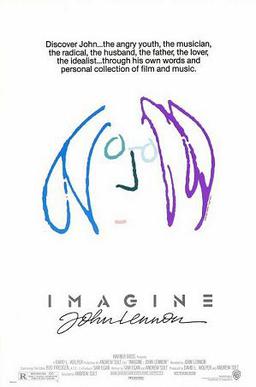
Imagine: John Lennon is a 1988 documentary film about English musician John Lennon. It was released on 7 October 1988, two days before Lennon's 48th birthday.
John and Yoko: A Love Story is a 1985 American made-for-television biographical film that chronicles the lives of John Lennon and Yoko Ono, beginning just before they met in 1966 and concluding with Lennon's murder in 1980. The movie was made with the co-operation of Ono, who controlled the song rights. It was directed by Sandor Stern and stars Mark McGann as Lennon and Kim Miyori as Ono.
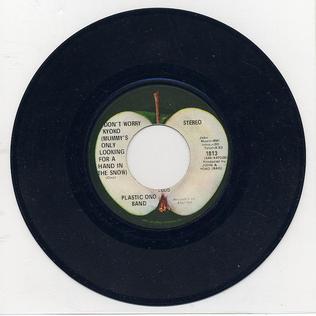
"Don't Worry Kyoko (Mummy's Only Looking for Her Hand in the Snow)" is a song by Yoko Ono that was originally released by Plastic Ono Band in October 1969 as the B-side of the "Cold Turkey" single, and was later released on Ono's 1971 album Fly. Several live versions have been released, including on Plastic Ono Band's Live Peace in Toronto 1969 and the John & Yoko/Plastic Ono Band With Elephant's Memory album Some Time in New York City in 1972. An early version was titled "Mum's Only Looking for Her Hand in the Snow". It has been covered by several other artists.

"Remember Love" is a song written by Yoko Ono and initially released as the B-side of John Lennon's and Ono's 1969 single "Give Peace a Chance."

"Who Has Seen the Wind?" is a song written by Yoko Ono that first appeared as the B-side of John Lennon's single "Instant Karma!" It was later issued as a bonus track on a compact disc version of the Wedding Album.
The Liverpool 08 Collection was the public art collection exhibited by Liverpool John Lennon Airport in conjunction with the Liverpool Culture Company for the duration of 2008, the year when Liverpool was the European Capital of Culture. Exhibits were launched before and during the year by various celebrities including Yoko Ono and Phil Redmond and much of the exhibition remains in place today. As well as the iconic sculptures, The Yellow Submarine sculpture and the John Lennon Statue, the different pieces of artwork situated around the public areas of the terminal included; two rare suits worn by John Lennon, photographs by Harry Goodwin and Paul Saltzman, mosaics from Debbie Ryan, graphic designs by John McFaul, a film by Nick Jordan, a performance of Brian Eno's 'Music for Airports' and artwork from 50 schoolchildren at St Ambrose Primary School in Speke
Self-Portrait was a 1969 film made by the artist Yoko Ono. Premiering at the Institute of Contemporary Arts in London on 10 September 1969, the 42-minute film consisted of a single shot of her husband John Lennon's semi-erect penis.
















